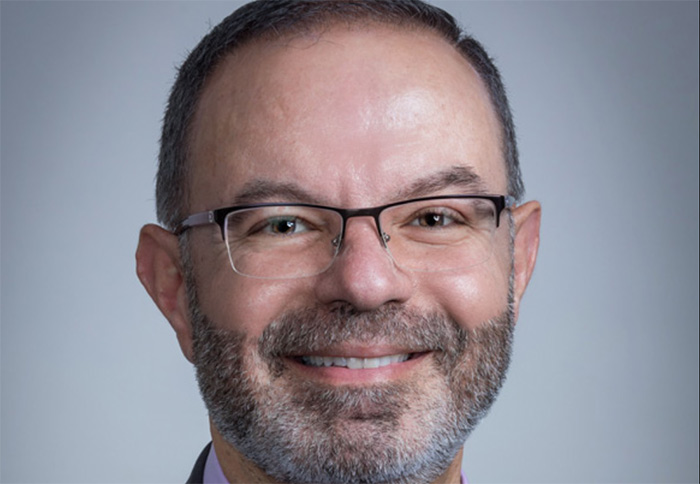Paul Buch: Music, spirituality, magical realism
Paul Buch, cantor at Temple Beth Israel in Pomona, is “a very satisfied Amazon customer.”
He regularly visits the online retailer to buy digital books, which he downloads onto his Kindle tablet. Recent purchases are evidence of his eclectic interests.
Not surprisingly for a cantor—whose job is to oversee the musical aspects of temple services, along with working with young people preparing for their Bar and Bat Mitzvah ceremonies—Mr. Buch loves music.
He is humble about his own abilities, which include playing what he characterizes as only passable guitar. The keyboard set up in his office, however, along with numerous CDs and a poster of his favorite blues guitarist, attest to his general fandom.
Mr. Buch enjoys reading the stories behind the creation of groundbreaking albums, the most recent of which is Ken Caillat’s Making Rumours: The Inside Story of the Classic Fleetwood Mac Album.
It is a record Mr. Buch is particularly fond of, because he listened to it almost nonstop when it was released in 1977. He was living in New York at the time, working as a photographer, mainly doing catalogue work. Rumours provided a soundtrack to his efforts, and to the time period in general.
Another recent download is in the area of spirituality rather than pop culture. He is in the midst of reading M.D. Eben Alexander III’s Proof of Heaven: A Neurosurgeon’s Journey into the Afterlife. In his book, released this year, Mr. Alexander shares an account of his encounter with the afterlife. At age 54, he became desperately ill with bacterial meningitis. After slipping into a coma, Mr. Alexander says he visited heaven.
“It’s the near-death experience observed by someone who has a very long and deep experience in the workings of the mind,” Mr. Buch noted.
While he still has two-thirds of the book to go, Mr. Buch said he finds the story’s emphasis—“that all humans share a common source that goes beyond what we’re able to describe in religious terms”—fascinating.
Mr. Buch recently downloaded another book dealing with an otherwordly experience, a science-fiction novel by Mary Doria Russell called Sparrow.
In Sparrow, a group of people travel to a newly-discovered planet called Rakhat to rendezvous with aliens with whom they have just made contact. Only one crewmember, a Jesuit priest, returns. The book deals with how he shares what he found during his mission, and how it affects humanity.
Mr. Buch enjoys speculative fiction from time to time because he often ponders celestial what-ifs.
“I believe within a relatively short period of time, perhaps within my children’s lifetime rather than mine, we will have direct contact with—or concrete evidence of—humanoid life in other worlds,” he said.
He often ponders how people will reconcile their spirituality given such an experience.
“That’s one of the reasons I’m so involved with interfaith work,” he said. “My sense is that as we evolve, humans will come to understand how individual religions or spiritual paths are, at their core, a fundamental attempt to establish a universal community.”
Mr. Buch also took a moment to discuss the reading that comes with his personal spiritual path. Members of the Jewish community are expected to read a section of the Torah, a holy book consisting of the first 5 books of the Jewish Bible, each week. After a year reading thusly, a person will have completed the Torah. They then are expected to start all over again.
“I find it utterly fascinating that for at least 2300 years, we have been learning from and reading from and living our lives from a singular text that has remained almost unchanged,” Mr. Buch said. “Through the lens of the Torah, we can come to understand our own humanity, which seems to have been relatively unchanged as well.”
The Torah should be read actively, Mr. Buch asserts, with readers making sure the text comes to meet them rather than the other way around. The cyclical nature of the yearly Torah readings—which ensures that a person reads the same section of the book as they turn 20, 30 and 40—helps the book remain vital.
“What I find is that it’s never like reading the same text twice. Every year, every time I come back to it, it has new meaning and new relevance. It’s wearing new clothes,” he said.
Mr. Buch doesn’t read novels as often as he’d like to, but when he does, he has a predilection for Latin American magical realism. He was first turned onto the genre when he sat on a plane next to a woman who had served as translator for Manuel Puig’s The Buenos Aires Affair.
Since then, Mr. Buch has devoured the works of authors like Jorge Luis Borges, Gabriel García Márquez and Cristina García.
“I find the characters and descriptive language and exoticsm of them to be really satisfying reading,” he said.
Reading is, indeed, satisfying to Mr. Buch, who regularly pores over the Los Angeles Times, the Inland Valley Daily Bulletin, the COURIER and the New York Times as well as the Huffington Post and the Israeli newspapers Haaretz and the Jerusalem Post. He never ceases to be amazed at the accessibility of the digital age, which can bring him any title he hears about within 2 days if not instantly.
“We’ve got everything ever written by man accessible and at our fingertips,” he said. “And I’m always looking for something.”
—Sarah Torribio
storribio@claremont-courier.com








0 Comments